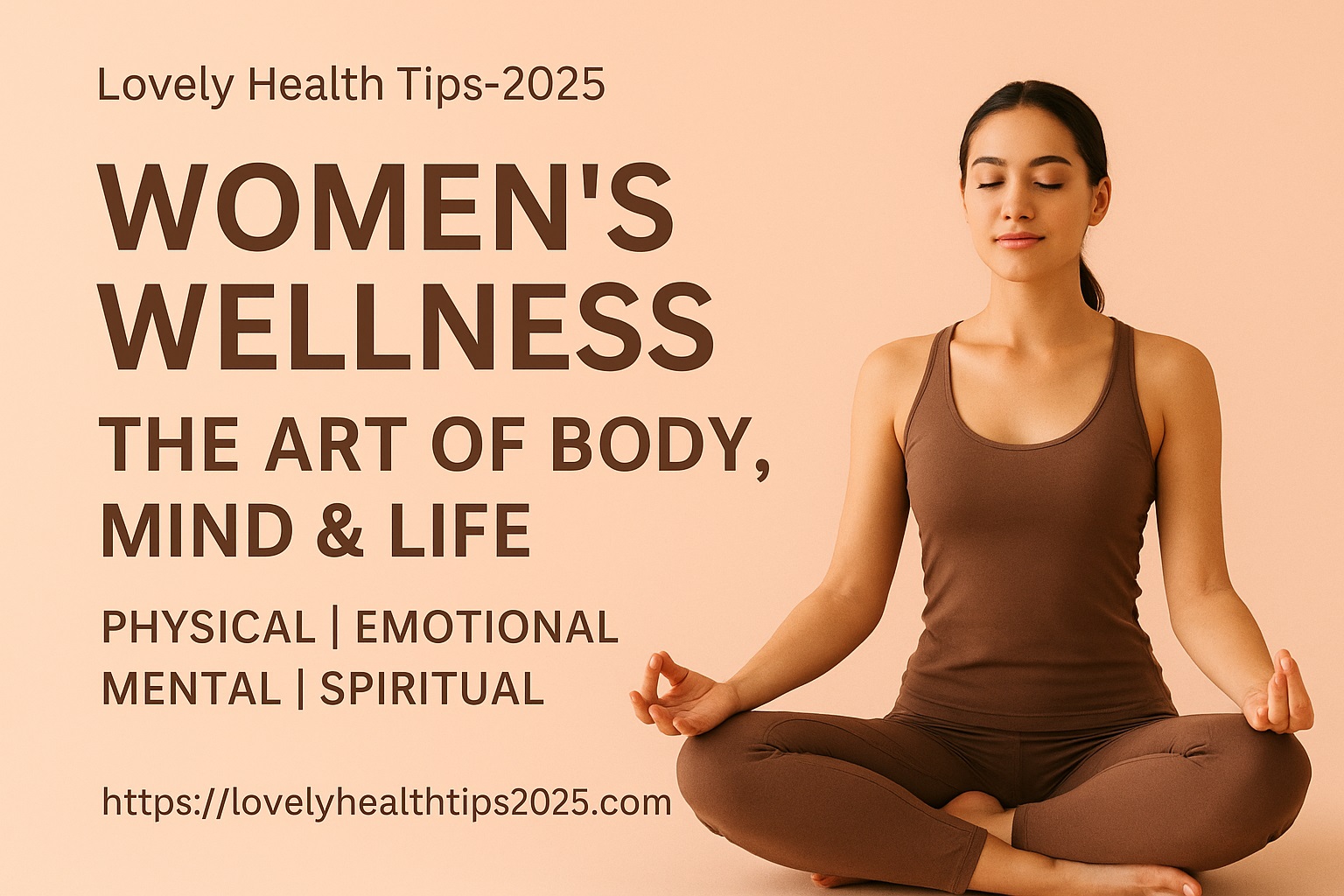Find out the Women’s wellness such as physical exercise, hormonal equilibrium, diet, self-care & mental health techniques to help women at any age of life.
Introduction:
True wellness is not only to live disease-free but also to prosper in all aspects in life. Wellness is about having good physical health, emotional stability, clarity in your head and social relationships. Since adolescence to motherhood and afterwards, every phase of a woman is associated with different challenges and health priorities.
In the modern busy lifestyle, it is a common occurrence that most women play various roles such as a professional, a caregiver, a partner, a homemaker etc. leaving their own health to burn. However, sustainable wellness is created when women prioritize self-care as an essential and not an indulgence.
This article aims to focus on the most important areas of women wellness such as hormonal balance, reproductive, mental, nutrition and preventive care and actionable measures to work towards being stronger, healthier and happier.
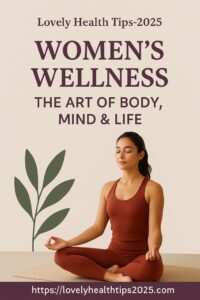
1. Physical Women’s wellness: The foundation of a healthy life.
Physical wellness begins with the functioning of the body and taking care of your body on a daily basis. Daily workouts, healthy eating and sleep are the foundation of overall health of a woman.
a) The role of exercise
Regular physical exercise is a great benefit to women. Workouts enhance metabolism, build bone density, control hormones and improve heart activity.
Key recommendations:
- Goal of 150 minutes of moderate exercises or vigorous exercise per week.
- Take strength training two times per week to avoid osteoporosis.
- Flexibility and stress relief
- Be flexible with yoga or Pilates.
- Even walking fast, dancing or even housekeeping is also considered movement that helps in general fitness.
b) Importance of sleep
The natural mechanism of body repair is sleep. Long time sleep deficiency may cause hormonal imbalances, low immunity and stress. Women, particularly during the menstrual periods or menopause, might have sleep disorder because of the hormonal changes. Regular sleeping, reduced screen time before sleep and a relaxing atmosphere can be used to regain the lost sleep.

2. Hormonal balance and reproductive health of women:
Hormones control the metabolism, mood as well as reproductive cycles. This balance is easily upset by the contemporary stress, unhealthy eating, and insomnia.
- No signs of acute or chronic endocrine disorders.
- Hormonal and Reproductive Health
- No acute or chronic endocrine diseases present.
Hormones are important in the control of metabolism, mood and reproductive cycles. But these days, lifestyle, stress and inappropriate diets can simply upset hormonal balance.
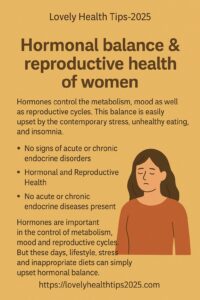
a) Menstrual Health
Following the menstrual cycle will make women learn about the rhythm of the body and indicate possible signs of hormonal disruptions. Painful times, irregular cycles or heavy bleeding should not be overlooked because they may be the symptoms of such conditions as PCOS (Polycystic Ovary Syndrome) or endometriosis.
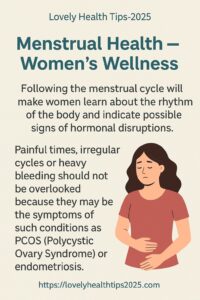
b) Maternity and health of mother.
The changes experienced by the body during pregnancy require more nutritional care, hydration and rest. Iron, folate, calcium and omega-3 fatty acids are the main nutrients that supplement the health of the mother and the fetus. The postpartum recovery is also a vital factor – the women must be given emotional support, physical rest and a balanced diet to recover the strength.
c) Menopause and beyond
Menopause becomes the termination of the reproductive life but it is the commencement of another era in the life of a woman. Lifestyle interventions can be used to address such symptoms, as a hot flash, sleep disturbances and mood variations.
- Healthy diet (large portions of phytoestrogens-rich foods like soy, flaxseeds, legumes etc.)
- Frequent physical activity and mental health.
- Doctor visit, in case of hormone replacement therapy.
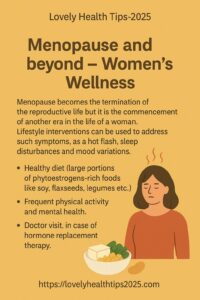
3. Nutrition: Nourishing of women
Women have nutrition as their pillar. Each phase of life, adolescence and post-menopause, requires certain nutrients to aid in growth, hormone and longevity.
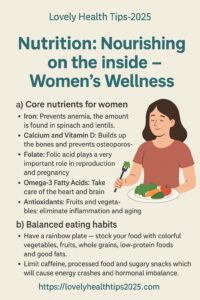
a) Core nutrients for women
Below is the table for core nutrients for women:
| Nutrient | Function | Sources |
|---|---|---|
| Iron | Prevents anemia | Spinach, lentils |
| Calcium + Vitamin D | Strengthens bones | Dairy, sesame seeds |
| Folate | Supports pregnancy | Green leafy vegetables |
| Omega-“3” | Heart & brain health – | Flaxseeds, fish etc. |
| Antioxidants | Reduce aging aagent | Berries, colorful veggies etc. |
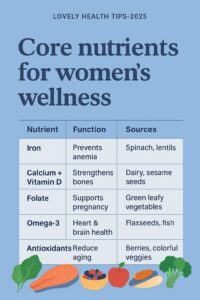
b) Balanced eating habits
Have a rainbow plate — stock your food with colorful vegetables, fruits, whole grains, low-protein foods and good fats. Limit caffeine, processed food and sugary snacks which will cause energy crashes and hormonal imbalance.
It is also important to be hydrated. Women tend not to recognize their fluid requirements – one should target at least 2 to 2.5 liters of water every day, depending on the activity and weather conditions.
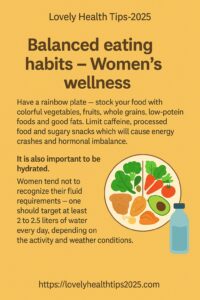
4. Emotional strength and intelligence.
Mental health of women is closely related to hormonal changes, life changes and social stressors. Women attempting to juggle both personal and work needs have become more and more anxious, depressed and experienced burnout. Mental exhaustion is also easy to detect, this is characterized by feelings of inability, frustration and a limitation
a) The mental fatigue
Symptoms of emotional strain are common and that includes irritability, mood swings, inability to concentrate and sleeping difficulties. The cure of awareness is the initial process of healing.
b) Practices of emotional self-care.
- Mindfulness & Meditation: Mindfulness every day lowers the level of anxiety and enhances concentration.
- Journaling: Notes help as a means of self-disclosure and self-understanding.
- Social Interaction: Hanging out with the friends or relatives who are supportive will help to feel more resilient emotionally.
- Professional Assistance: It is a symbol of power and not a sign of weakness.
c) Work-life balance
It is necessary to establish limits. Get to know how to say no when overloaded. Focus on priorities and outsource where feasible. Having a balanced schedule will minimize stress and will give one time to rest and recreation.
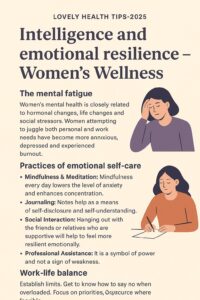
5. Preventive health: Earliest diagnosis saves life.
Preventive care will enable women to monitor and address health complications at their early stages.
Important Female Examinations. Even in cases where one feels well, annual health checkups would make sure that problems such as diabetes, high blood pressure, or thyroid problems are addressed at an early stage
| Age Range | Key Tests & Screenings |
|---|---|
| 20s to 30s | Pap smear after every 3 years, breast self-exam every month |
| 40s to 50s | Mammogram once in 1–2 years, blood sugar and cholesterol screening |
| 50 & above | Bone density test, colon cancer test, thyroid check etc. |
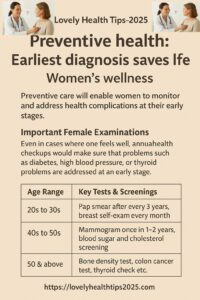
Vaccinations
Vaccines against HPV, influenza and tetanus boosters should be up-to-date among the females to avoid infections that can have long-term effects on health
6. The wellness of the social environment
Wellness should not only be about the individual but also about his or her relationships, community and the environment.
a) Healthy relationships
Good social ties help to ward off loneliness and stress. There is the ability to communicate freely with partners, family and friends, which result in emotional security.
b) Safe environment
Physical well-being is enhanced by a clean and toxin-free home and work place. Do not be exposed to toxic substances in cosmetics and plastics. Use natural substitutes which are eco-friendly.
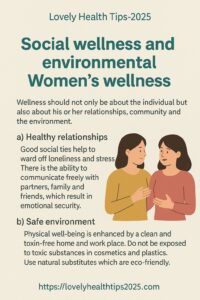
7. Spiritual wellness
Religion is not always spiritual wellness, it is purpose, gratitude and inner peace. Yoga, deep breathing, prayer or spending time in nature practices are more effective towards enhancing mindfulness and self-awareness. They are used to make women re-align their values and create resilience in their lives when faced with difficulties
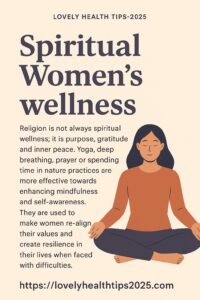
8. The importance of rest and rejuvenation.
It is not idleness of rest, but re-birth. Contemporary women tend to go to extremes without taking a break to recuperate. Short breaks, recreational activities, listening to music or having some quiet time by herself are some of the ways of re-energizing the mind and body.
Mindful relaxation can be achieved with the help of regular self-care rituals, such as a warm bath, a skincare routine or reading before bed.
9. Wellness of Women & technology
Contemporary technologies will enable women to track and enhance their health:
- Cyclical period tracking
- Sleep monitoring & fitness trackers.
- Remote visits to achieve convenient care.
- Being conscious of technology makes women be knowledgeable and active in the choices they make concerning their health.
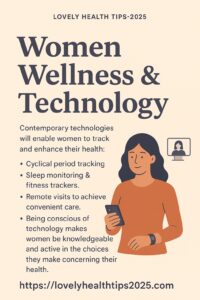
10. Holistic wellness of women – Recap
Every wellness is holistic – it is not just referring to the physical health only but also the mental, emotional and spiritual enrichment. A woman, who listens to her body, respects her feelings and defines boundaries, brings balance in every field of her life.
The holistic wellness model comprises of:
- Consumption of clean and natural foods.
- Practicing daily gratitude
- Staying physically active
- The aspect of lifelong learning.
- Harvesting relationships that empower and enhance development.
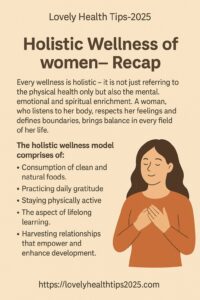
Concluding points:
The wellness of women changes with change of life phases such as adolescence, motherhood, menopause and even later. The truth is in moderation, finding a balance between work and rest, ambition and self-understanding and consideration of other people and self-interest.
Women who focus on the wellness do not only improve their live, they make the lives of families, communities and future generations better. Your health is your power.
Reference from my previous articles which may be referred:
- Women Hormone Balance Diet : Food, Meal Plan & Lifestyle Tips – lovelyhealthtips2025.com
- 7 Natural Remedy for Acne & hormones – lovelyhealthtips2025.com
- Top 5 Anti-Aging Supplements – lovelyhealthtips2025.com
- 7 Natural Foods : balance women’s hormones – lovelyhealthtips2025.com
- Gender equality issues in Adolescent people
Reference from different sources may be referred:
- Women’s health
- All Women’s Health Articles | Page 1 – Harvard Health
- And Still She Rises: Policies for Improving Women’s Health for a More Equitable Post-Pandemic World – PMC
- Building a healthier world by women and for women is key to achieving gender equality
- Women’s and girls’ health throughout the life course
- Women’s Health Information: Everything You Need to Know
- New Directions For Women’s Health: Expanding Understanding, Improving Research, Addressing Workforce Limitations – PubMed
- Women’s health – Wikipedia
- Women’s Preventive Services Initiative’s Well-Woman Chart: A Summary of Preventive Health Recommendations for Women – PubMed
- The Women’s Preventive Services Initiative Well-Woman Chart: A Helpful Tool for the Practice of Internal Medicine – The American Journal of Medicine
- Understanding progress and challenges in women’s health and wellbeing in exemplar countries: a time-series study identifying positive outliers – The Lancet Global Health
Thanks and Regards.
About the Author – “Mr. Bibhu Ranjan Mund”, Master in Public Health (MPH) from IIHMR University, Jaipur (Rajasthan) has experience of 18 years in Public Health activities. Through “Lovely Health Tips-2025”, we share the evidence & experienced based health & wellness guides with solutions for every day well-being. More from Author
Disclaimer
This information is suggestive only and not a replacement for medical advice. For more detail, please visit to my website as mentioned below:

